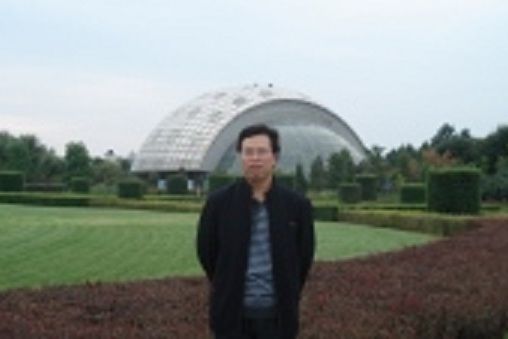基本介紹
- 中文名:史剛榮
- 外文名:Gangrong Shi
- 國籍:中國
- 民族:漢族
- 出生日期:1968 年7 月
- 畢業院校:南京農業大學
- 性別:男
- 職稱:教授
人物簡介,研究方向,科研項目,發表論文,
人物簡介
史剛榮,男,漢族,1968 年7 月生。教授,博士,碩士研究生導師。1992 年7 月西北師範大學生物教育專業畢業並獲理學學士學位,同年被分配到甘肅省隴西師範學校任教。2001 年3 月獲西北師範大學植物學專業碩士學位(研究方向為植物物種生物學) ,同年調入淮北師範大學任教。2009 年6 月獲南京農業大學植物學專業博士學位,研究方向為植物環境生理生態。2009 年11 月晉升為教授。
研究方向
主要研究領域包括植物生理生態學、結構植物學和污染生態學等。在退化生態系統恢復演替過程中優勢樹種在解剖生理特徵上的可塑性及其生態學意義、能源植物的重金屬耐性機理等方面有較為系統的研究。主持國家自然科學基金面上項目3項。以第一作者或通訊作者發表學術論文60餘篇,其中SCI 論文30 篇。參編“十二五”規劃教材2部。“耐重金屬脅迫的能源植物篩選及其適應性研究”被評為2010 年江蘇省優秀博士論文和南京農業大學優秀博士論文。1篇在國際會議ICBT2008 上獲優秀論文三等獎。
科研項目
1. 利用轉錄組與蛋白組關聯分析揭示花生鎘吸收轉運的分子機制。國家自然科學基金面上項目。項目編號:31671599。起止年月:2017.1—2018.12. 主持人,經費:25萬元。
2. 植物根系形態對鎘的可塑性回響機制:避逆還是覓食?國家自然科學基金面上項目。項目編號:31370515。起止年月:2014.1—2017.12. 主持人,經費:75萬元。
3. 花生鎘污染預防品種篩選與籽粒富鎘生理機制研究。 國家自然科學基金面上項目。項目編號:31171464。起止年月:2012.1—2015.12. 主持人,經費:64萬元。
4. 鎘污染土地資源利用---能源植物大麻耐鎘種質資源的篩選與生長調控。國家自然科學基金,項目編號:40971296,起止年月:2010.1—2012.12。主要參與人。經費:40萬元。
5. 花生籽粒鎘積累及其在品種間差異的生理機制。安徽省自然科學基金,項目編號:11040606M87,起止年月:2011.1—2012.12。主持人,經費:5萬元。
6. 多變低水環境下根系生長、功能的調控及其機制。黃土高原土壤侵蝕與旱地農業國家重點實驗室開放基金 (重點項目) 。項目編號:10501-277,起止年月:2011.1—2012.12。主持人,經費:8萬元。
發表論文
1. Shi G, Cai Q. Cadmium tolerance and accumulation in eight potential energy crops. Biotechnology Advances, 2009, 27(5): 555-561.
2.Shi G*, Sun L, Wang X, Liu C. Leaf responses to iron nutrition and low cadmium in peanut: anatomical properties in relation to gas exchange. Plant and Soil, 2014, 375(1-2): 99-111.
3. Su Y, Wang X, Liu C, Shi G. Variation in cadmium accumulation and translocation among peanut cultivars as affected by iron deficiency. Plant and Soil, 2013, 363(1-2): 201-213.
4. Su G, Li F, Lin J, Liu C, Shi G. Peanut as a potential crop for bioenergy production via Cd-phytoextraction: A life-cycle pot experiment. Plant and Soil, 2013, 365(1-2):337-345.
5. Liu C, Guo J, Cui Y, L� T, Zhang X, Shi G. Effects of cadmium and salicylic acid on growth, spectral reflectance and photosynthesis of castor bean seedlings. Plant and Soil, 2011, 344(1-2), 131-141.
6. Su Y, Liu J, Lu Z, Wang X, Zhang Z, Shi G*. Effects of iron deficiency on subcellular distribution and chemical forms of cadmium in peanut roots in relation to its translocation. Environmental and Experimental Botany, 2014, 97: 40-48.
7. Shi G*, Xia S, Ye J, Huang Y, Liu C, Zhang Z. PEG-simulated drought stress decreases cadmium accumulation in castor bean by altering root morphology. Environmental and Experimental Botany, 2015, 111: 127-134.
8. Xia S, Wang X, Su G, Shi G*. Effects of drought on cadmium accumulation in peanuts grown in a contaminated calcareous soil. Environmental Science and Pollution Research, 2015, 22(23): 18707-18717.
9. Xia S, Deng R, Zhang Z, Liu C, Shi G*. Variations in the accumulation and translocation of cadmium among pak choi cultivars as related to root morphology. Environmental Science and Pollution Research, 2016, 23(10): 9832–9842.
10. Yu R, Xia S, Liu C, Zhang Z, Shi G*. Variations in root morphology among 18 herbaceous species and their relationship with cadmium accumulation. Environmental Science and Pollution Research, 2017, 24(5): 4731-4740.
11. Shi G*, Xia S, Liu C, Zhang Z. Cadmium accumulation and growth response to cadmium stress of eighteen plant species. Environmental Science and Pollution Research, 2016, 23(22): 23071-23080.
12. Yu R, Li D, Du X, Xia S, Liu C, Shi G*. Comparative transcriptome analysis reveals key cadmium transport-related genes in roots of two pak choi (Brassica rapa L. ssp. chinensis) cultivars. BMC genomics, 2017, 18(1): 587.
13. Shi G, Cai Q. Leaf plasticity in peanut (Arachis hypogaea L.) in response to heavy metal stress. Environmental and Experimental Botany, 2009, 67(1): 112-117.
14. Lu Z, Zhang Z, Su Y, Liu C, Shi G*. Cultivar variation in morphological response of peanut roots to cadmium stress and its relation to cadmium accumulation. Ecotoxicology and Environmental Safety, 2013, 91: 147-155.
15. Shi G*, Su G, Lu Z, Liu C, Wang X. Relationship between biomass, seed components and seed Cd concentration in various peanut (Arachis hypogaea L.) cultivars grown on Cd-contaminated soils. Ecotoxicology and Environmental Safety, 2014, 110: 174-181.
16. Yu R, Tang Y, Liu C, Du X, Miao C, Shi G*. Comparative transcriptomic analysis reveals the roles of ROS scavenging genes in response to cadmium in two pak choi cultivars. Scientific reports, 2017, 7(1): 9217.
17. Chen C, Xia S, Deng R, Liu C, Shi G*. AhIRT1 and AhNRAMP1 metal transporter expression correlates with Cd uptake in peanuts under iron deficiency. PloS One, 2017, 12(10): e0185144.
18. Shi G, Liu C, Cui M, Ma Y, Cai Q. Cadmium tolerance and bioaccumulation of 18 hemp accessions. Applied Biochemistry and Biotechnology, 2012, 168(1), 163-173.
19. Zhang Z, Liu C, Wang X, Shi G*. Cadmium-induced alterations in morpho- physiology of two peanut cultivars differing in cadmium accumulation. Acta Physiologiae Plantarum, 2013, 35(7): 2105-2112.
20. Shi GR, Cai QS. Photosynthetic and anatomic responses of peanut leaves to zinc stress. Biologia Plantarum, 2009, 53(2): 391-394.
21. Shi G, Cai Q, Liu C, Wu L. Silicon alleviates cadmium toxicity in peanut plants in relation to cadmium distribution and stimulation of antioxidative enzymes. Plant Growth Regulation, 2010, 61(1):45-52.
22. Shi G, Cai Q, Liu Q, Wu L. Salicylic acid-mediated alleviation of cadmium toxicity in hemp plants in relation to cadmium uptake, photosynthesis and antioxidant enzymes. Acta Physiologiae Plantarum, 2009, 31(5): 969-977.
23. Shi GR, Cai QS. Photosynthetic and anatomic responses of peanut leaves to cadmium stress. Photosynthetica, 2008, 46(4): 627-630.
24. Shi G*, Zhang Z, Liu C. Silicon influences cadmium translocation by altering subcellular distribution and chemical forms of cadmium in peanut roots. Archives of Agronomy and Soil Science, 2017, 63(1): 117-123.
25. Liu C, Yu R, Shi G*. Effects of drought on the accumulation and redistribution of cadmium in peanuts at different developmental stages. Archives of Agronomy and Soil Science, 2017, 63(8): 1049-1057.
26. Shi G, Liu C, Cai Q, Liu Q, Hou C. Cadmium accumulation and tolerance of two safflower cultivars in relation to photosynthesis and antioxidantive enzymes. Bulletin of Environmental Contamination and Toxicology. 2010, 85(3): 256-263.
27. Shi G, Cai Q. Zinc tolerance and accumulation in eight oil crops. Journal of Plant Nutrition, 2010, 33(7): 982-997.
28. Su Y, Zhang Z, Su G, Liu J, Liu C, Shi G*. Genotypic differences in spectral and photosynthetic response of peanut to iron deficiency. Journal of Plant Nutrition, 2015, 38(1): 145-160.
29. Shi G*, Zhu-Ge F, Liu Z, Le L. Photosynthetic responses and acclimation of two castor bean cultivars to repeated drying–wetting cycles. Journal of Plant Interactions, 2014, 9(1): 783-790.
30. Liu CF, Li YH, Shi GR. Utilize heavy metal-contaminated farmland to develop bioenergy. Advanced Materials Research, 2012, 414: 254-261.
31. Jiang L, Shi G, Ding Y, Lou L, Cai Q. Differential responses of two bamboo species (Phyllostachys auresulcata `spectabilis' and Pleioblastus chino `hisauchii') to excess copper. BioEnergy Research, 2013, 6:1223–1229.

